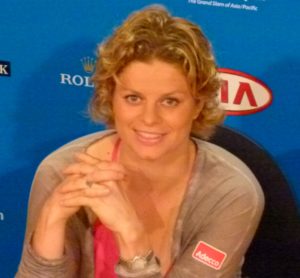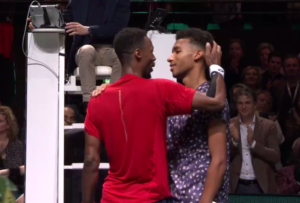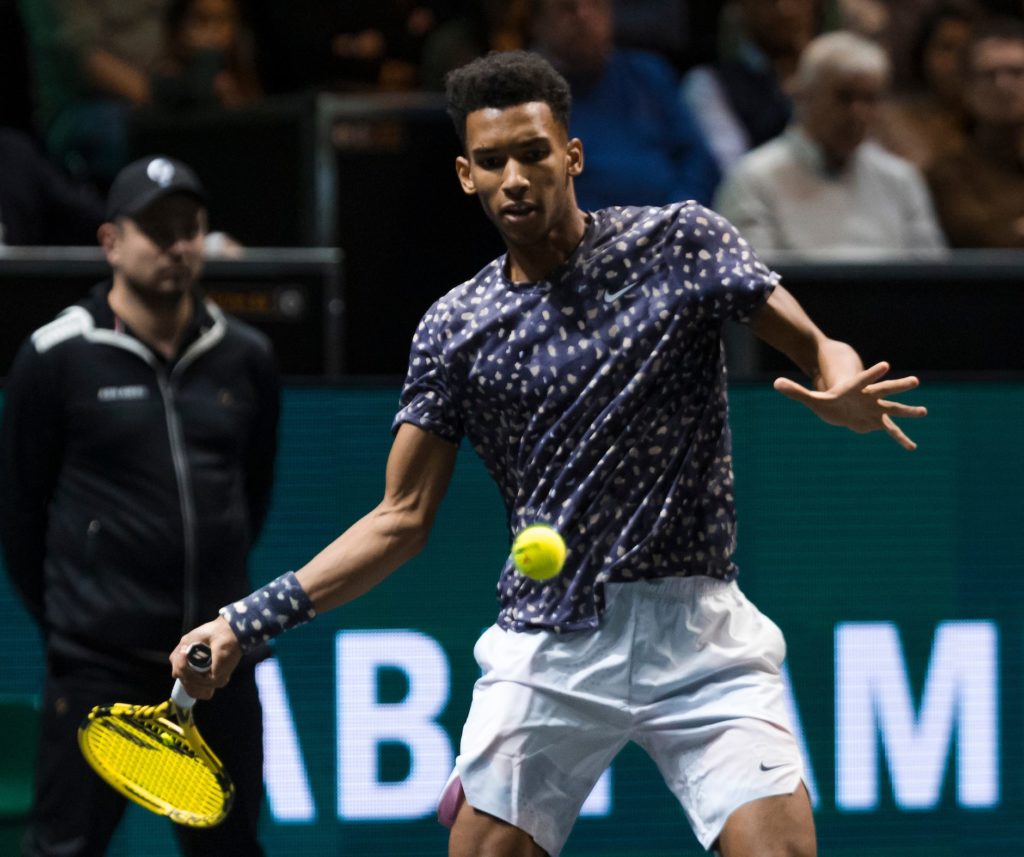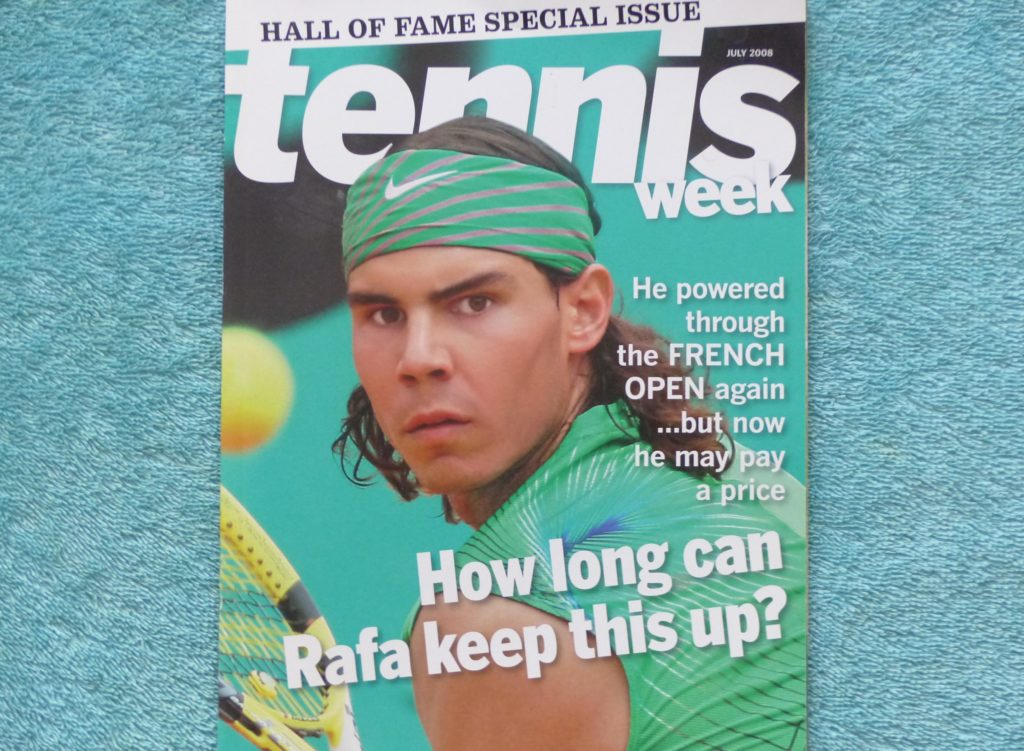These are interesting times in tennis with players from across the age spectrum providing compelling stories.
Last week, with 38-year-old Roger Federer, 33-year-old Rafael Nadal or 32-year-old Novak Djokovic absent, it was Gael Monfils, 33, defeating Félix Auger-Aliassime, 19, 6-2, 6-4 in the final of the Rotterdam ATP 500 event.
This week has seen the return of 36-year-old Kim Clijsters to the WTA tour after more than seven years away, reminding fans that the sport of tennis in the 21st century is open to second acts – actually a third act in her case.
Clijsters acquitted herself remarkably well in a 6-2, 7-6(6) loss to Garbine Muguruza on Monday in Dubai and it can only be good for the sport to have someone with her winsome personality back in the game.
The unpretentious Belgian is one of the most universally-loved players. This writer recalls an incident circa 2001 when he was walking through a staging area at the Australian Open and saw a group of ballkids seated on the ground in a circle chattering away. Who was right in there with them, and not hanging out in the players’ lounge with adult coaches, agents or family members, someone who was roughly the same age – Clijsters herself?
 In a similar way, Gael Monfils is a well-respected, good guy on the men’s tour. While it was no fun for Auger-Aliassime to lose the Rotterdam final 6-2, 6-4 to the Frenchman, even he described Monfils as “a good friend.”
The final Sunday began auspiciously as both players held serve to 2-all. Auger-Aliassime was hitting bigger while Monfils was tracking down balls and sending them back at something below max velocity.
That was clearly his strategy and slowly the unforced errors began to mount off the Auger-Aliassime racquet (32 UEs total to 14 for Monfils) – particularly on the forehand. He did a terrific job to win three games from 2-6, 1-5 down, showing the kind of penetrating ball-striking he is capable of. But, finally, Monfils was able to end the match, serving out to 15 in the last game.
It’s interesting to speculate, in view of how tired Monfils appeared at the very end (he had been fighting a bug all week) that maybe Auger-Aliassime could have joined the Frenchman in a game of attrition, prolonging rallies and trying to wear him down.
In a similar way, Gael Monfils is a well-respected, good guy on the men’s tour. While it was no fun for Auger-Aliassime to lose the Rotterdam final 6-2, 6-4 to the Frenchman, even he described Monfils as “a good friend.”
The final Sunday began auspiciously as both players held serve to 2-all. Auger-Aliassime was hitting bigger while Monfils was tracking down balls and sending them back at something below max velocity.
That was clearly his strategy and slowly the unforced errors began to mount off the Auger-Aliassime racquet (32 UEs total to 14 for Monfils) – particularly on the forehand. He did a terrific job to win three games from 2-6, 1-5 down, showing the kind of penetrating ball-striking he is capable of. But, finally, Monfils was able to end the match, serving out to 15 in the last game.
It’s interesting to speculate, in view of how tired Monfils appeared at the very end (he had been fighting a bug all week) that maybe Auger-Aliassime could have joined the Frenchman in a game of attrition, prolonging rallies and trying to wear him down. In the aftermath of the final, it was frequently noted that Auger-Aliassime has now lost all four ATP Tour finals he has played. That’s a negative but those results are better understood when put in context – especially because he was 18 years old for the first three.
Rio de Janeiro (clay) ATP 500 – 2019: Laslo Djere 6-3, 7-5.
Auger-Aliassime was playing Djere, who had lost his parents – his mother Hajnalka died in 2012 and his father Caba just two months earlier – both of colon cancer. The 23-year-old Serb, who had beaten Dominic Thiem in the first round, played like a man possessed. Also, Auger-Aliassime had to be feeling the pressure of his first chance at an ATP title.
Lyon (clay) ATP 250 – 2019: Benoit Paire 6-4, 6-3.
Auger-Aliassime had tweaked his groin in the semi-final the previous day in a hard-fought 2-6, 7-6(3), 6-4 win over No. 18-ranked Nikoloz Basilashvili. It got worse in the final and by the second set he was basically only staying out there to provide a show for the spectators and to not rain on the 30-year-old Paire’s victory parade.
Stuttgart (grass) ATP 250 – 2019: Matteo Berrettini 6-4, 7-6(11).
This was obviously Auger-Aliassime’s best opportunity – and the second set score indicates that a deciding set was a definite possibility. But the then-23-year-old Italian was the form player and would go on to finish the season ranked an impressive No. 8.
Rotterdam (indoor hard) ATP 500 – 2020: Gael Monfils 6-2, 6-4.
The 33-year-old Monfils completed a run of fine tennis – winning nine matches in a row to take the titles in Montpelier and Rotterdam. Ranked No. 9, the Frenchman seems to have a newfound maturity on court and it helped him outplay an increasingly frustrated and error-prone Auger-Aliassime. By rallying from 1-5 to 4-5 in the second set Auger-Aliassime showed his fighting spirit. Also 14/17 net points won was a positive stat for him.
[caption id="attachment_100698" align="alignnone" width="1024"]
In the aftermath of the final, it was frequently noted that Auger-Aliassime has now lost all four ATP Tour finals he has played. That’s a negative but those results are better understood when put in context – especially because he was 18 years old for the first three.
Rio de Janeiro (clay) ATP 500 – 2019: Laslo Djere 6-3, 7-5.
Auger-Aliassime was playing Djere, who had lost his parents – his mother Hajnalka died in 2012 and his father Caba just two months earlier – both of colon cancer. The 23-year-old Serb, who had beaten Dominic Thiem in the first round, played like a man possessed. Also, Auger-Aliassime had to be feeling the pressure of his first chance at an ATP title.
Lyon (clay) ATP 250 – 2019: Benoit Paire 6-4, 6-3.
Auger-Aliassime had tweaked his groin in the semi-final the previous day in a hard-fought 2-6, 7-6(3), 6-4 win over No. 18-ranked Nikoloz Basilashvili. It got worse in the final and by the second set he was basically only staying out there to provide a show for the spectators and to not rain on the 30-year-old Paire’s victory parade.
Stuttgart (grass) ATP 250 – 2019: Matteo Berrettini 6-4, 7-6(11).
This was obviously Auger-Aliassime’s best opportunity – and the second set score indicates that a deciding set was a definite possibility. But the then-23-year-old Italian was the form player and would go on to finish the season ranked an impressive No. 8.
Rotterdam (indoor hard) ATP 500 – 2020: Gael Monfils 6-2, 6-4.
The 33-year-old Monfils completed a run of fine tennis – winning nine matches in a row to take the titles in Montpelier and Rotterdam. Ranked No. 9, the Frenchman seems to have a newfound maturity on court and it helped him outplay an increasingly frustrated and error-prone Auger-Aliassime. By rallying from 1-5 to 4-5 in the second set Auger-Aliassime showed his fighting spirit. Also 14/17 net points won was a positive stat for him.
[caption id="attachment_100698" align="alignnone" width="1024"] Photo: ABN AMRO WTT/Henk Koster[/caption]
Maybe the most famous example of losing four finals in a row was Ivan Lendl in the 1980s at the Grand Slam events. He then won eight of his next 15 finals.
Lendl’s former player, Andy Murray, was also 0-4 in his first four Grand Slam final attempts. After that, against the greatest trio – Federer-Nadal-Djokovic – in tennis history, Murray managed to win three of seven.
The runner-up finish in Rotterdam raised Auger-Aliassime’s ranking to No. 18, one off his career best. But it will be impossible for him to improve on it this week at the ATP 250 in Marseille. He’s defending the 300 points he earned last year as runner-up in Rio de Janeiro, the same number he received last week for reaching the Rotterdam final. He starts out on Wednesday against No. 85-ranked Stefano Travaglia and then would play the winner of No. 79 Pierre-Hugues Herbert and No. 69 Mikhail Kukushkin before possibly facing the third seed, No. 10-ranked David Goffin, in the quarter-finals.
[caption id="attachment_100686" align="alignnone" width="1024"]
Photo: ABN AMRO WTT/Henk Koster[/caption]
Maybe the most famous example of losing four finals in a row was Ivan Lendl in the 1980s at the Grand Slam events. He then won eight of his next 15 finals.
Lendl’s former player, Andy Murray, was also 0-4 in his first four Grand Slam final attempts. After that, against the greatest trio – Federer-Nadal-Djokovic – in tennis history, Murray managed to win three of seven.
The runner-up finish in Rotterdam raised Auger-Aliassime’s ranking to No. 18, one off his career best. But it will be impossible for him to improve on it this week at the ATP 250 in Marseille. He’s defending the 300 points he earned last year as runner-up in Rio de Janeiro, the same number he received last week for reaching the Rotterdam final. He starts out on Wednesday against No. 85-ranked Stefano Travaglia and then would play the winner of No. 79 Pierre-Hugues Herbert and No. 69 Mikhail Kukushkin before possibly facing the third seed, No. 10-ranked David Goffin, in the quarter-finals.
[caption id="attachment_100686" align="alignnone" width="1024"] Photo: ABN AMRO WTT/Henk Koster[/caption]
A this point in Auger-Aliassime’s development, the tour is more of a distance run than a sprint. “You’re young, you improved fast,” Monfils said to him during the presentation ceremony. “I’m sure you know you’re going to win this tournament and other tournaments. So keep going like this. And well done to your team because it was a real pleasure to be on the court with you today.”
A final note on Monfils. Usually when the coin toss at the net is over, players make a bee-line for the baseline to start their business. On Sunday in Rotterdam, you could see Monfils turn briefly and nod toward Auger-Aliassime as he began to head back. It was as if the sporting gesture implied “we’re both in this together and we’re still friends.” A small thing maybe, but not something you would see from many other players.
Photo: ABN AMRO WTT/Henk Koster[/caption]
A this point in Auger-Aliassime’s development, the tour is more of a distance run than a sprint. “You’re young, you improved fast,” Monfils said to him during the presentation ceremony. “I’m sure you know you’re going to win this tournament and other tournaments. So keep going like this. And well done to your team because it was a real pleasure to be on the court with you today.”
A final note on Monfils. Usually when the coin toss at the net is over, players make a bee-line for the baseline to start their business. On Sunday in Rotterdam, you could see Monfils turn briefly and nod toward Auger-Aliassime as he began to head back. It was as if the sporting gesture implied “we’re both in this together and we’re still friends.” A small thing maybe, but not something you would see from many other players.
 Looking in the bedside night-table last week we came across this July, 2008, copy of the now-defunct publication Tennis Week.
The headline was a grabber, especially more than 11 years later with Rafael Nadal still going strong and ranked No. 2 in the world after finishing 2019 at No. 1.
In the article, well-respected fitness expert Pat Etcheberry is quoted as saying about the then 22-year-old Nadal, who was a four-time defending French Open champion, “it’s like putting miles on a car – eventually the car will wear down. Plus, Rafa isn’t the lightest guy out there, and all the constant pounding puts strain on the knees and the hamstrings.”
Etcheberry wasn’t the only one to express concerns about Nadal’s longevity. But all these years later the now-33-year-old Spaniard has certainly showed his staying power. Ironically, he had his unforgettable, five-set Wimbledon victory over Roger Federer in the final just as this cover story was appearing in print. His total Grand Slam titles won now stands at 19 – one shy of Federer’s record of 20.
Looking in the bedside night-table last week we came across this July, 2008, copy of the now-defunct publication Tennis Week.
The headline was a grabber, especially more than 11 years later with Rafael Nadal still going strong and ranked No. 2 in the world after finishing 2019 at No. 1.
In the article, well-respected fitness expert Pat Etcheberry is quoted as saying about the then 22-year-old Nadal, who was a four-time defending French Open champion, “it’s like putting miles on a car – eventually the car will wear down. Plus, Rafa isn’t the lightest guy out there, and all the constant pounding puts strain on the knees and the hamstrings.”
Etcheberry wasn’t the only one to express concerns about Nadal’s longevity. But all these years later the now-33-year-old Spaniard has certainly showed his staying power. Ironically, he had his unforgettable, five-set Wimbledon victory over Roger Federer in the final just as this cover story was appearing in print. His total Grand Slam titles won now stands at 19 – one shy of Federer’s record of 20.
 In a similar way, Gael Monfils is a well-respected, good guy on the men’s tour. While it was no fun for Auger-Aliassime to lose the Rotterdam final 6-2, 6-4 to the Frenchman, even he described Monfils as “a good friend.”
The final Sunday began auspiciously as both players held serve to 2-all. Auger-Aliassime was hitting bigger while Monfils was tracking down balls and sending them back at something below max velocity.
That was clearly his strategy and slowly the unforced errors began to mount off the Auger-Aliassime racquet (32 UEs total to 14 for Monfils) – particularly on the forehand. He did a terrific job to win three games from 2-6, 1-5 down, showing the kind of penetrating ball-striking he is capable of. But, finally, Monfils was able to end the match, serving out to 15 in the last game.
It’s interesting to speculate, in view of how tired Monfils appeared at the very end (he had been fighting a bug all week) that maybe Auger-Aliassime could have joined the Frenchman in a game of attrition, prolonging rallies and trying to wear him down.
In a similar way, Gael Monfils is a well-respected, good guy on the men’s tour. While it was no fun for Auger-Aliassime to lose the Rotterdam final 6-2, 6-4 to the Frenchman, even he described Monfils as “a good friend.”
The final Sunday began auspiciously as both players held serve to 2-all. Auger-Aliassime was hitting bigger while Monfils was tracking down balls and sending them back at something below max velocity.
That was clearly his strategy and slowly the unforced errors began to mount off the Auger-Aliassime racquet (32 UEs total to 14 for Monfils) – particularly on the forehand. He did a terrific job to win three games from 2-6, 1-5 down, showing the kind of penetrating ball-striking he is capable of. But, finally, Monfils was able to end the match, serving out to 15 in the last game.
It’s interesting to speculate, in view of how tired Monfils appeared at the very end (he had been fighting a bug all week) that maybe Auger-Aliassime could have joined the Frenchman in a game of attrition, prolonging rallies and trying to wear him down. In the aftermath of the final, it was frequently noted that Auger-Aliassime has now lost all four ATP Tour finals he has played. That’s a negative but those results are better understood when put in context – especially because he was 18 years old for the first three.
Rio de Janeiro (clay) ATP 500 – 2019: Laslo Djere 6-3, 7-5.
Auger-Aliassime was playing Djere, who had lost his parents – his mother Hajnalka died in 2012 and his father Caba just two months earlier – both of colon cancer. The 23-year-old Serb, who had beaten Dominic Thiem in the first round, played like a man possessed. Also, Auger-Aliassime had to be feeling the pressure of his first chance at an ATP title.
Lyon (clay) ATP 250 – 2019: Benoit Paire 6-4, 6-3.
Auger-Aliassime had tweaked his groin in the semi-final the previous day in a hard-fought 2-6, 7-6(3), 6-4 win over No. 18-ranked Nikoloz Basilashvili. It got worse in the final and by the second set he was basically only staying out there to provide a show for the spectators and to not rain on the 30-year-old Paire’s victory parade.
Stuttgart (grass) ATP 250 – 2019: Matteo Berrettini 6-4, 7-6(11).
This was obviously Auger-Aliassime’s best opportunity – and the second set score indicates that a deciding set was a definite possibility. But the then-23-year-old Italian was the form player and would go on to finish the season ranked an impressive No. 8.
Rotterdam (indoor hard) ATP 500 – 2020: Gael Monfils 6-2, 6-4.
The 33-year-old Monfils completed a run of fine tennis – winning nine matches in a row to take the titles in Montpelier and Rotterdam. Ranked No. 9, the Frenchman seems to have a newfound maturity on court and it helped him outplay an increasingly frustrated and error-prone Auger-Aliassime. By rallying from 1-5 to 4-5 in the second set Auger-Aliassime showed his fighting spirit. Also 14/17 net points won was a positive stat for him.
[caption id="attachment_100698" align="alignnone" width="1024"]
In the aftermath of the final, it was frequently noted that Auger-Aliassime has now lost all four ATP Tour finals he has played. That’s a negative but those results are better understood when put in context – especially because he was 18 years old for the first three.
Rio de Janeiro (clay) ATP 500 – 2019: Laslo Djere 6-3, 7-5.
Auger-Aliassime was playing Djere, who had lost his parents – his mother Hajnalka died in 2012 and his father Caba just two months earlier – both of colon cancer. The 23-year-old Serb, who had beaten Dominic Thiem in the first round, played like a man possessed. Also, Auger-Aliassime had to be feeling the pressure of his first chance at an ATP title.
Lyon (clay) ATP 250 – 2019: Benoit Paire 6-4, 6-3.
Auger-Aliassime had tweaked his groin in the semi-final the previous day in a hard-fought 2-6, 7-6(3), 6-4 win over No. 18-ranked Nikoloz Basilashvili. It got worse in the final and by the second set he was basically only staying out there to provide a show for the spectators and to not rain on the 30-year-old Paire’s victory parade.
Stuttgart (grass) ATP 250 – 2019: Matteo Berrettini 6-4, 7-6(11).
This was obviously Auger-Aliassime’s best opportunity – and the second set score indicates that a deciding set was a definite possibility. But the then-23-year-old Italian was the form player and would go on to finish the season ranked an impressive No. 8.
Rotterdam (indoor hard) ATP 500 – 2020: Gael Monfils 6-2, 6-4.
The 33-year-old Monfils completed a run of fine tennis – winning nine matches in a row to take the titles in Montpelier and Rotterdam. Ranked No. 9, the Frenchman seems to have a newfound maturity on court and it helped him outplay an increasingly frustrated and error-prone Auger-Aliassime. By rallying from 1-5 to 4-5 in the second set Auger-Aliassime showed his fighting spirit. Also 14/17 net points won was a positive stat for him.
[caption id="attachment_100698" align="alignnone" width="1024"] Photo: ABN AMRO WTT/Henk Koster[/caption]
Maybe the most famous example of losing four finals in a row was Ivan Lendl in the 1980s at the Grand Slam events. He then won eight of his next 15 finals.
Lendl’s former player, Andy Murray, was also 0-4 in his first four Grand Slam final attempts. After that, against the greatest trio – Federer-Nadal-Djokovic – in tennis history, Murray managed to win three of seven.
The runner-up finish in Rotterdam raised Auger-Aliassime’s ranking to No. 18, one off his career best. But it will be impossible for him to improve on it this week at the ATP 250 in Marseille. He’s defending the 300 points he earned last year as runner-up in Rio de Janeiro, the same number he received last week for reaching the Rotterdam final. He starts out on Wednesday against No. 85-ranked Stefano Travaglia and then would play the winner of No. 79 Pierre-Hugues Herbert and No. 69 Mikhail Kukushkin before possibly facing the third seed, No. 10-ranked David Goffin, in the quarter-finals.
[caption id="attachment_100686" align="alignnone" width="1024"]
Photo: ABN AMRO WTT/Henk Koster[/caption]
Maybe the most famous example of losing four finals in a row was Ivan Lendl in the 1980s at the Grand Slam events. He then won eight of his next 15 finals.
Lendl’s former player, Andy Murray, was also 0-4 in his first four Grand Slam final attempts. After that, against the greatest trio – Federer-Nadal-Djokovic – in tennis history, Murray managed to win three of seven.
The runner-up finish in Rotterdam raised Auger-Aliassime’s ranking to No. 18, one off his career best. But it will be impossible for him to improve on it this week at the ATP 250 in Marseille. He’s defending the 300 points he earned last year as runner-up in Rio de Janeiro, the same number he received last week for reaching the Rotterdam final. He starts out on Wednesday against No. 85-ranked Stefano Travaglia and then would play the winner of No. 79 Pierre-Hugues Herbert and No. 69 Mikhail Kukushkin before possibly facing the third seed, No. 10-ranked David Goffin, in the quarter-finals.
[caption id="attachment_100686" align="alignnone" width="1024"] Photo: ABN AMRO WTT/Henk Koster[/caption]
A this point in Auger-Aliassime’s development, the tour is more of a distance run than a sprint. “You’re young, you improved fast,” Monfils said to him during the presentation ceremony. “I’m sure you know you’re going to win this tournament and other tournaments. So keep going like this. And well done to your team because it was a real pleasure to be on the court with you today.”
A final note on Monfils. Usually when the coin toss at the net is over, players make a bee-line for the baseline to start their business. On Sunday in Rotterdam, you could see Monfils turn briefly and nod toward Auger-Aliassime as he began to head back. It was as if the sporting gesture implied “we’re both in this together and we’re still friends.” A small thing maybe, but not something you would see from many other players.
Photo: ABN AMRO WTT/Henk Koster[/caption]
A this point in Auger-Aliassime’s development, the tour is more of a distance run than a sprint. “You’re young, you improved fast,” Monfils said to him during the presentation ceremony. “I’m sure you know you’re going to win this tournament and other tournaments. So keep going like this. And well done to your team because it was a real pleasure to be on the court with you today.”
A final note on Monfils. Usually when the coin toss at the net is over, players make a bee-line for the baseline to start their business. On Sunday in Rotterdam, you could see Monfils turn briefly and nod toward Auger-Aliassime as he began to head back. It was as if the sporting gesture implied “we’re both in this together and we’re still friends.” A small thing maybe, but not something you would see from many other players.
CHECKING IN
 Looking in the bedside night-table last week we came across this July, 2008, copy of the now-defunct publication Tennis Week.
The headline was a grabber, especially more than 11 years later with Rafael Nadal still going strong and ranked No. 2 in the world after finishing 2019 at No. 1.
In the article, well-respected fitness expert Pat Etcheberry is quoted as saying about the then 22-year-old Nadal, who was a four-time defending French Open champion, “it’s like putting miles on a car – eventually the car will wear down. Plus, Rafa isn’t the lightest guy out there, and all the constant pounding puts strain on the knees and the hamstrings.”
Etcheberry wasn’t the only one to express concerns about Nadal’s longevity. But all these years later the now-33-year-old Spaniard has certainly showed his staying power. Ironically, he had his unforgettable, five-set Wimbledon victory over Roger Federer in the final just as this cover story was appearing in print. His total Grand Slam titles won now stands at 19 – one shy of Federer’s record of 20.
Looking in the bedside night-table last week we came across this July, 2008, copy of the now-defunct publication Tennis Week.
The headline was a grabber, especially more than 11 years later with Rafael Nadal still going strong and ranked No. 2 in the world after finishing 2019 at No. 1.
In the article, well-respected fitness expert Pat Etcheberry is quoted as saying about the then 22-year-old Nadal, who was a four-time defending French Open champion, “it’s like putting miles on a car – eventually the car will wear down. Plus, Rafa isn’t the lightest guy out there, and all the constant pounding puts strain on the knees and the hamstrings.”
Etcheberry wasn’t the only one to express concerns about Nadal’s longevity. But all these years later the now-33-year-old Spaniard has certainly showed his staying power. Ironically, he had his unforgettable, five-set Wimbledon victory over Roger Federer in the final just as this cover story was appearing in print. His total Grand Slam titles won now stands at 19 – one shy of Federer’s record of 20.






